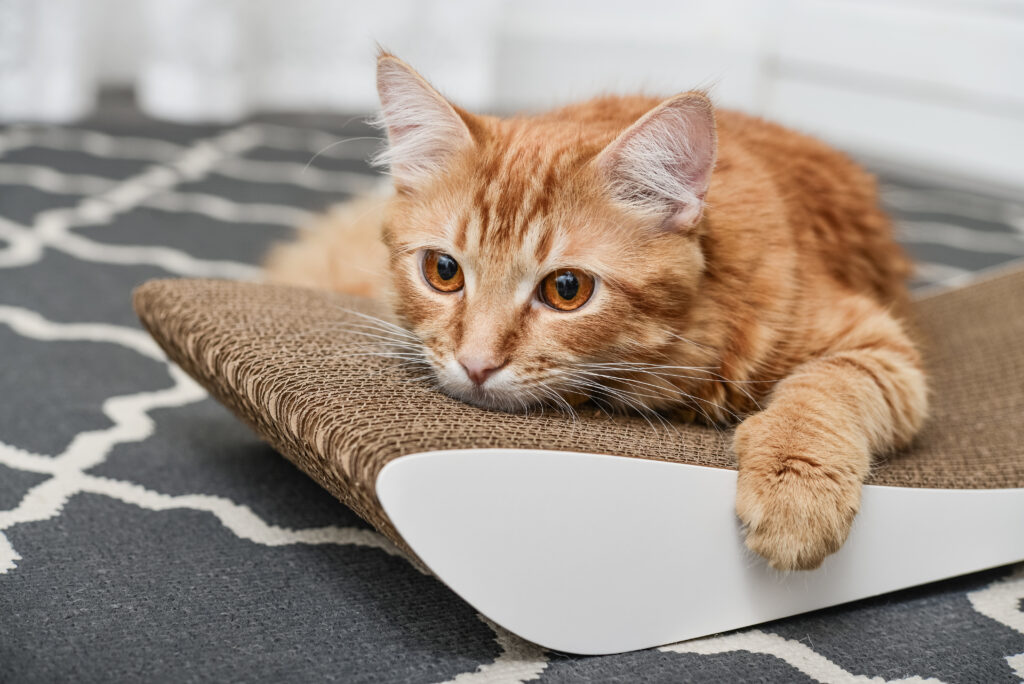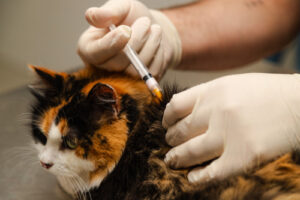Cats are wonderful companions, but when your feline friend starts spraying indoors, it can be both frustrating and concerning. Cats spray to mark their territory, communicate with other cats, or express anxiety. The expert team at Loveland Regional Animal Hospital is here to help you understand why your cat is spraying indoors and how to address this behavior to maintain a harmonious home. If you need further assistance, call Loveland Regional Animal Hospital at (513) 697-9796.
Why Do Cats Spray?
Cats spray for several reasons, primarily related to communication and territorial marking. When a cat sprays, it releases pheromones, signaling to other cats that a particular area is their territory. This behavior can be triggered by changes in the household, such as the introduction of a new pet or family member, moving to a new home, or even rearranging furniture. Additionally, cats may spray due to stress, anxiety, or medical issues.
What Are Triggers for Cat Spraying?
To stop your cat from spraying indoors, you must identify the triggers causing this behavior. Observing your cat’s environment and noting any changes can help pinpoint the source of stress or anxiety. Common triggers include the presence of other cats, both indoors and outdoors, changes in the household, and environmental stressors.
Environmental Changes
Cats are sensitive to changes in their environment. Moving to a new home, redecorating, or introducing new furniture can cause stress, leading to spraying. Even minor changes, such as new scents from cleaning products or air fresheners, can trigger this behavior. Keeping your cat’s environment as consistent as possible and gradually introducing changes can help reduce stress.
Presence of Other Animals
The presence of other cats, either within your home or in the surrounding neighborhood, can lead to spraying. Cats may feel the need to mark their territory to establish dominance or to communicate with other cats. If you have multiple cats, ensure they each have their own space, resources, and litter boxes to minimize territorial disputes.
Creating a Comfortable Environment to Reduce Spraying
Creating a comfortable and secure environment for your cat can significantly reduce spraying behavior. Providing your cat with a safe, stress-free space can help them feel more relaxed and less likely to spray.
Provide Adequate Resources
Ensure your cat has access to essential resources, such as food, water, and litter boxes. In multi-cat households, provide multiple resources to prevent competition and reduce stress. Each cat should have its own litter box, placed in quiet, low-traffic areas of the home.
Create Safe Spaces
Cats need safe, quiet spaces where they can retreat and feel secure. Provide your cat with cozy beds, hiding spots, and elevated perches. These safe spaces can help your cat feel more in control of their environment and reduce anxiety.
Behavioral and Environmental Modification
Modifying your cat’s behavior and environment can help stop spraying. Behavioral modification involves changing your cat’s responses to triggers, while environmental modification focuses on altering the surroundings to reduce stress.
Use of Pheromone Diffusers
Pheromone diffusers, such as Feliway, can help reduce stress and prevent spraying. These diffusers release synthetic pheromones that mimic the natural calming pheromones cats produce. Placing diffusers in areas where your cat sprays can create a more calming environment.
Regular Play and Exercise
Interactive toys, puzzle feeders, and scheduled playtime can keep your cat mentally and physically stimulated. A well-exercised cat is less likely to spray out of boredom or frustration.
How to Address Medical Issues Causing Spraying
If your cat’s spraying behavior persists despite environmental and behavioral modifications, consult with your veterinarian.
Urinary Tract Issues
Symptoms of UTIs include frequent urination, straining to urinate, and blood in the urine. If you notice any of these signs, contact Loveland Regional Animal Hospital for a thorough examination and appropriate treatment.
Hormonal Factors
Unneutered male cats are more likely to spray due to hormonal influences. Neutering can significantly reduce spraying behavior in male cats. Similarly, spaying female cats can help prevent spraying. Consult your veterinarian to discuss the benefits of neutering or spaying your cat.
Maintaining a Stress-Free Home
By creating a stable environment and addressing potential stressors, you can help your cat feel secure and comfortable.
Consistent Routine
Cats thrive on routine. Establishing a consistent daily routine for feeding, playtime, and other activities can help reduce stress and anxiety. Predictability in their environment can make cats feel more secure and less likely to spray.
Reduce Environmental Stressors
Loud noises, unfamiliar visitors, and changes in routine can all contribute to anxiety. Creating a calm, quiet home environment can help your cat feel more at ease.
Encouraging Positive Behavior
Encouraging positive behavior and providing appropriate outlets for marking can help reduce spraying. Positive reinforcement and proper litter box maintenance play crucial roles in this process.
Positive Reinforcement
Rewarding your cat for using the litter box and engaging in desired behaviors can reinforce positive habits. Treats, praise, and affection can be effective rewards. Consistently acknowledging and rewarding positive behavior can help discourage spraying.
Proper Litter Box Maintenance
Scoop the litter box daily and change the litter regularly. Ensure the litter box is in a quiet, accessible location. Cats may avoid dirty or inconvenient litter boxes, leading to inappropriate marking behaviors.
Promoting Your Cat’s Well-being
Your cat’s well-being is the foundation of a spray-free home. By focusing on their physical and emotional needs, you can create an environment that supports their happiness and reduces unwanted behaviors.
Regular Veterinary Check-ups
Annual exams can help detect and address any medical issues that may contribute to spraying. Your veterinarian at Loveland Regional Animal Hospital can provide guidance on managing stress and maintaining your cat’s overall well-being.
Monitor for Behavioral Changes
Sudden changes in habits or increased anxiety may indicate underlying issues. Early detection and intervention can prevent the development of spraying behavior.
By following these strategies on how to stop a cat from spraying indoors, you can create a more harmonious home for both you and your feline friend. For further assistance, call Loveland Regional Animal Hospital at (513) 697-9796.





